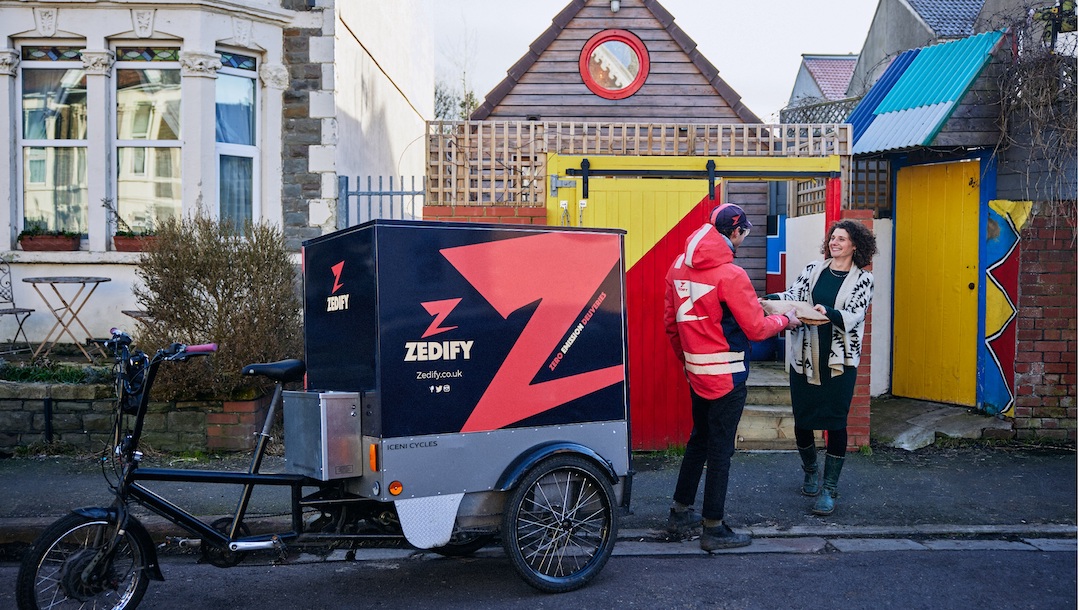Zedify – the UK’s largest electric cargo bike delivery network – has secured £5m investment led by Barclays Sustainable Impact Capital and MEIF Proof of Concept & Early Stage Fund, which is managed by Mercia and part of the Midlands Engine Investment Fund, with participation from existing investor Green Angel Syndicate.
The funding will enable the Cambridge-based company – which currently operates in ten UK cities – to roll out the service to more locations including Birmingham and Manchester and more than double in size with the creation of over 120 jobs nationwide.
Zedify’s zero emissions service focuses on ‘first and last mile’ deliveries within city centres, where vans are less efficient due to traffic congestion and exacerbate air pollution. The company works in partnerships with leading national delivery firms as well as big retail brands and hundreds of regional and local businesses.
Zedify operates ‘microhubs’ on the edge of city centres where parcels are consolidated for onward delivery. It also has its own fleet of electric cargo bikes and its own technology platform which offers consumers a choice about when they receive deliveries and optimises for the most cost-effective and low-impact routes. Research by Zedify shows its last-mile operations are 90% more carbon-efficient than an electric van fleet.
Zedify was founded in 2018 by Rob King, who had previously run a delivery business in Cambridge, and Sam Keam, who had a similar operation in Brighton. They set out to make it the ‘go to green solution for last-mile delivery in the UK’. The company uses only directly employed staff who are paid a real living wage and, to encourage local ownership, its network includes both depots run by Zedify and franchises.
The company – which secured investments totalling £1.5m by Green Angel Syndicate in 2020 and 2021 – has doubled its revenue in each of the last four years. In addition to expanding its network, the latest funding round will enable it to further enhance its technology and increase staff numbers from 113 to over 250.
Rob King, co-founder and CEO, said: “Zedify’s model delivers tangible benefits- significant carbon reduction in the last mile; a fairer system for workers which counteracts the gig economy; cleaner, safer deliveries that contribute to healthier, more liveable cities; and more choice for consumers about how and when they receive their parcels. It’s exciting to have the backing of new and existing investors to enable us to realise our mission to transform urban logistics and create cities that are truly better for everyone.”
Gavin Chapman, Co-Head of Principal Investments at Barclays said: “We understand that the delivery and logistics industry will require significant investment over the coming years to align with the UK’s net zero targets. Barclays are proud to support Zedify in their goal to normalise the use of hyperlocal microhubs and zero emission delivery vehicles within UK cities.”
Kiran Mehta, Investment Manager at Mercia, said: “Cargo bike delivery is a fast-growing market as councils seek to reduce congestion and pollution and consumers demand more environmentally-friendly solutions. Zedify sets itself apart from other bike delivery companies due to its unique business model and its rapid growth which has given it a ‘first mover’ advantage. The funding will enable it to make a step change in the business in the coming years.”
Mark Wilcockson, Senior Investment Manager at the British Business Bank, said: “The MEIF supports innovative business in the Midlands, with this latest investment being a great example of the funds support to promote sustainability as part of the region’s aim to reach net zero targets. This latest investment in Zedify shows how the MEIF continues to support businesses in relocating and investing into the region with new headquarters, creating wider growth for the Midlands.”
The Midlands Engine Investment Fund is supported financially by the European Union using funding from the European Regional Development Fund (ERDF) as part of the European Structural and Investment Funds Growth Programme 2014-2020 and the European Investment Bank.
